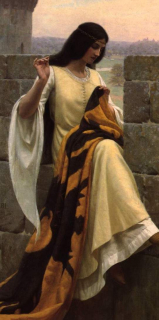 What was it Michael Crichton said? ” The fourteenth century was a world where women took lovers at will and plotted assassination and rebellion.”
In this world it was impossible for domestic bliss to be isolated From bloody conflict. War surrounded and all too often enveloped even the best defended castles.In any case there are those who would oppose her just because she is a woman. Ximene discovers that even in Occitan itself there are men who resent the very suggestion of a woman’s interference in Affairs of State.
What was it Michael Crichton said? ” The fourteenth century was a world where women took lovers at will and plotted assassination and rebellion.”
In this world it was impossible for domestic bliss to be isolated From bloody conflict. War surrounded and all too often enveloped even the best defended castles.In any case there are those who would oppose her just because she is a woman. Ximene discovers that even in Occitan itself there are men who resent the very suggestion of a woman’s interference in Affairs of State.
What was it Michael Crichton said? ” The fourteenth century was a world where women took lovers at will and plotted assassination and rebellion.”
In this world it was impossible for domestic bliss to be isolated From bloody conflict. War surrounded and all too often enveloped even the best defended castles.
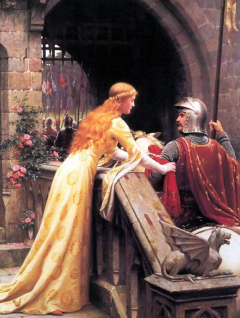 The women, through the agency of the courts of love made their own alliances. These were more concerned with longer term relationships between families rather than short term quarrels about insignificant territorial quarrelsThe women, through the agency of the courts of love made their own alliances. These were more concerned with longer term relationships between families rather than short term quarrels about insignificant territorial quarrels.
The women, through the agency of the courts of love made their own alliances. These were more concerned with longer term relationships between families rather than short term quarrels about insignificant territorial quarrelsThe women, through the agency of the courts of love made their own alliances. These were more concerned with longer term relationships between families rather than short term quarrels about insignificant territorial quarrels. In religion too, women show leadership. There are no churches or chapels, so credentes gathered in the home of the local Perfect, often a woman, a Parfaite. Many women retired to convents when they passed the age of menopause. This was not because of saintly instincts and not necessarily because they were tired of sexual activity as many convents allowed visitors. It was just a proclamation that they had retired from the world of amorous politicsIn religion too, women show leadership. There are no churches or chapels, so credentes gathered in the home of the local Perfect, often a woman, a Parfaite. Many women retired to convents when they passed the age of menopause. This was not because of saintly instincts and not necessarily because they were tired of sexual activity as many convents allowed visitors. It was just a proclamation that they had retired from the world of amorous politics.
In religion too, women show leadership. There are no churches or chapels, so credentes gathered in the home of the local Perfect, often a woman, a Parfaite. Many women retired to convents when they passed the age of menopause. This was not because of saintly instincts and not necessarily because they were tired of sexual activity as many convents allowed visitors. It was just a proclamation that they had retired from the world of amorous politicsIn religion too, women show leadership. There are no churches or chapels, so credentes gathered in the home of the local Perfect, often a woman, a Parfaite. Many women retired to convents when they passed the age of menopause. This was not because of saintly instincts and not necessarily because they were tired of sexual activity as many convents allowed visitors. It was just a proclamation that they had retired from the world of amorous politics.
 Ximene discovers that her best friend Alyse is considering a future where she will use the courts of love to escalate her contact with powerful men to a point where she is powerful herself.
Ximene is speaking,
‘Affairs of the heart, though wonderful, are often transitory. You will both move on’
Alyse replies,
‘ I know that, but by then I will have met many other powerful men. I may have given some of them my favour. I will be able to choose which of them will father my child. I will start a dynasty. No arranged marriages for me.’
Ximene sighed. ‘Is that really what we have been taught? I suppose that is the practical result of our beliefs, except it seems to me that your objectives are all material. What about the spiritual world?’
There is sadness in Ximene’s voice because on the one hand she is being asked to sacrifice everything, possibly even her life, to help this faith survive and yet now she is being faced with the realization that the courts of love, an integral part of the culture promoted by the faith, can be used differently by those with different objectives. Ximene discovers that her best friend Alyse is considering a future where she will use the courts of love to escalate her contact with powerful men to a point where she is powerful herself.
Ximene discovers that her best friend Alyse is considering a future where she will use the courts of love to escalate her contact with powerful men to a point where she is powerful herself.
Ximene is speaking,
‘Affairs of the heart, though wonderful, are often transitory. You will both move on’
Alyse replies,
‘ I know that, but by then I will have met many other powerful men. I may have given some of them my favour. I will be able to choose which of them will father my child. I will start a dynasty. No arranged marriages for me.’
Ximene sighed. ‘Is that really what we have been taught? I suppose that is the practical result of our beliefs, except it seems to me that your objectives are all material. What about the spiritual world?’
There is sadness in Ximene’s voice because on the one hand she is being asked to sacrifice everything, possibly even her life, to help this faith survive and yet now she is being faced with the realization that the courts of love, an integral part of the culture promoted by the faith, can be used differently by those with different objectives. Ximene discovers that her best friend Alyse is considering a future where she will use the courts of love to escalate her contact with powerful men to a point where she is powerful herself.
Ximene is speaking,
‘Affairs of the heart, though wonderful, are often transitory. You will both move on’
Alyse replies,
‘ I know that, but by then I will have met many other powerful men. I may have given some of them my favour. I will be able to choose which of them will father my child. I will start a dynasty. No arranged marriages for me.’
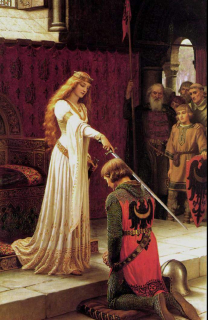 IThere is sadness in Ximene’s voice because on the one hand she is being asked to sacrifice everything, possibly even her life, to help this faith survive and yet now she is being faced with the realization that the courts of love, an integral part of the culture promoted by the faith, can be used differently by those with different objectives.
More generally it is not like this. Women from the south inherit lands, titles and corresponding responsibilities without any need to develop relationships with powerful men. It did not make them any less feminine, any less desirable. Lords and troubadours both traveled far to pay homage to Etiennette de Pennautier, who was known as Loba, the she wolf, in her own castle. Loba took many lovers but she rejected many more suitors than she accepted. Those who pleased her received her Accolade, a very special knighthood. ( for more details on the award of the Accolade see -More about Ximenes World /Chivalry.)IThere is sadness in Ximene’s voice because on the one hand she is being asked to sacrifice everything, possibly even her life, to help this faith survive and yet now she is being faced with the realization that the courts of love, an integral part of the culture promoted by the faith, can be used differently by those with different objectives.
IThere is sadness in Ximene’s voice because on the one hand she is being asked to sacrifice everything, possibly even her life, to help this faith survive and yet now she is being faced with the realization that the courts of love, an integral part of the culture promoted by the faith, can be used differently by those with different objectives.
More generally it is not like this. Women from the south inherit lands, titles and corresponding responsibilities without any need to develop relationships with powerful men. It did not make them any less feminine, any less desirable. Lords and troubadours both traveled far to pay homage to Etiennette de Pennautier, who was known as Loba, the she wolf, in her own castle. Loba took many lovers but she rejected many more suitors than she accepted. Those who pleased her received her Accolade, a very special knighthood. ( for more details on the award of the Accolade see -More about Ximenes World /Chivalry.)IThere is sadness in Ximene’s voice because on the one hand she is being asked to sacrifice everything, possibly even her life, to help this faith survive and yet now she is being faced with the realization that the courts of love, an integral part of the culture promoted by the faith, can be used differently by those with different objectives.
More generally it is not like this. Women from the south inherit lands, titles and corresponding responsibilities without any need to develop relationships with powerful men. It did not make them any less feminine, any less desirable. Lords and troubadours both traveled far to pay homage to Etiennette de Pennautier, who was known as Loba, the she wolf, in her own castle. Loba took many lovers but she rejected many more suitors than she accepted. Those who pleased her received her Accolade, a very special knighthood. ( for more details on the award of the Accolade see -More about Ximenes World /Chivalry.)
 When these women, educated and nurtured in this system, come in contact with different world, dominated by the Roman Church their independence, education, confidence, and initiative comes as something of a shock to those they meet. For those like Alyse, who have ambition, and varied talents, there are considerable opportunities to rise to positions of great influence. There even a chance, however remote, that she might become a Queen.When these women, educated and nurtured in this system, come in contact with different world, dominated by the Roman Church their independence, education, confidence, and initiative comes as something of a shock to those they meet. For those like Alyse, who have ambition, and varied talents, there are considerable opportunities to rise to positions of great influence. There even a chance, however remote, that she might become a Queen.
When these women, educated and nurtured in this system, come in contact with different world, dominated by the Roman Church their independence, education, confidence, and initiative comes as something of a shock to those they meet. For those like Alyse, who have ambition, and varied talents, there are considerable opportunities to rise to positions of great influence. There even a chance, however remote, that she might become a Queen.When these women, educated and nurtured in this system, come in contact with different world, dominated by the Roman Church their independence, education, confidence, and initiative comes as something of a shock to those they meet. For those like Alyse, who have ambition, and varied talents, there are considerable opportunities to rise to positions of great influence. There even a chance, however remote, that she might become a Queen.
 When these women, educated and nurtured in this system, come in contact with different world, dominated by the Roman Church their independence, education, confidence, and initiative comes as something of a shock to those they meet. For those like Alyse, who have ambition, and varied talents, there are considerable opportunities to rise to positions of great influence. There even a chance, however remote, that she might become a Queen.Increasingly Cathars covered at least one of their contractual marriages with a Church of Rome ceremony. This avoided the suspicion of heresy. All children, including ‘illegitimate’ children take an equal share of their parent’s estate. A woman knows exactly who are her children and the man has a reasonable idea. This convention is only possible because spiritual relationships have, by definition, within the Cathar faith no material element. There is therefore no transferring of wealth before or after an out of marriage relationship. There could be a transfer after a formal contracted marriage, depending on what the contract specified, but even then the contract was more likely to specify that wealth of the couple should be shared.
When these women, educated and nurtured in this system, come in contact with different world, dominated by the Roman Church their independence, education, confidence, and initiative comes as something of a shock to those they meet. For those like Alyse, who have ambition, and varied talents, there are considerable opportunities to rise to positions of great influence. There even a chance, however remote, that she might become a Queen.Increasingly Cathars covered at least one of their contractual marriages with a Church of Rome ceremony. This avoided the suspicion of heresy. All children, including ‘illegitimate’ children take an equal share of their parent’s estate. A woman knows exactly who are her children and the man has a reasonable idea. This convention is only possible because spiritual relationships have, by definition, within the Cathar faith no material element. There is therefore no transferring of wealth before or after an out of marriage relationship. There could be a transfer after a formal contracted marriage, depending on what the contract specified, but even then the contract was more likely to specify that wealth of the couple should be shared.
In any relationship a decision is made to procreate a child, for three months before an attempt at conception the woman willingly enters into a household controlled by her partner’s family. The conception would then be an occasion of great celebration in which the woman would be released into her partner’s bed from her self-imposed exile. Women considered this a small price to pay for a lifetime of freedom.
For many women already in possession of a rich inheritance it does not matter who the father of her children might be, they all share her inheritance. If the father owns a child then the child will also share the fathers inheritance. This system leads to greater stability than might be imagined. The religion demands few children and examination of land distribution over many generations shows little change in the absolute size of estates.
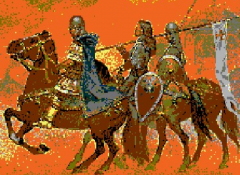 A heroine for Cathar women was Eleanor of Aquitaine. She and her family spoke the Limousin dialect of Occitan. Hers was the best recorded of the courts of love and famously judged that love in marriage was "extremly unlikely" and the participants should look elsewhere. She had been forced into marriage with Louis VII, King of the Franks. She soon found that though Louis had married he he liked virtually nothing about Eleanor. The relationship finally broke down when Eleanor accompanied him on the crusade. Lois was no better at fighting than he was as a lover.A heroine for Cathar women was Eleanor of Aquitaine. She and her family spoke the Limousin dialect of Occitan. Hers was the best recorded of the courts of love and famously judged that love in marriage was “extremly unlikely” and the participants should look elsewhere. She had been forced into marriage with Louis VII, King of the Franks. She soon found that though Louis had married he he liked virtually nothing about Eleanor. The relationship finally broke down when Eleanor accompanied him on the crusade. Lois was no better at fighting than he was as a lover.
A heroine for Cathar women was Eleanor of Aquitaine. She and her family spoke the Limousin dialect of Occitan. Hers was the best recorded of the courts of love and famously judged that love in marriage was "extremly unlikely" and the participants should look elsewhere. She had been forced into marriage with Louis VII, King of the Franks. She soon found that though Louis had married he he liked virtually nothing about Eleanor. The relationship finally broke down when Eleanor accompanied him on the crusade. Lois was no better at fighting than he was as a lover.A heroine for Cathar women was Eleanor of Aquitaine. She and her family spoke the Limousin dialect of Occitan. Hers was the best recorded of the courts of love and famously judged that love in marriage was “extremly unlikely” and the participants should look elsewhere. She had been forced into marriage with Louis VII, King of the Franks. She soon found that though Louis had married he he liked virtually nothing about Eleanor. The relationship finally broke down when Eleanor accompanied him on the crusade. Lois was no better at fighting than he was as a lover.
 Eleanor is supposed to have taken two lovers during the crusade, her uncle Raymond of Antioch, and a Scaracen, possibly a very young Saladin. Certainly she was missing for two months after the return of her husband. On her return to Paris she started an affair with Henry of Anjou and sued Louis for divorce. She confronted the court considering her divorce naked and posed the question "Do not you think my body is beautiful my lords? My husband however thinks it is the work ok the Devil"Eleanor is supposed to have taken two lovers during the crusade, her uncle Raymond of Antioch, and a Scaracen, possibly a very young Saladin. Certainly she was missing for two months after the return of her husband. On her return to Paris she started an affair with Henry of Anjou and sued Louis for divorce. She confronted the court considering her divorce naked and posed the question “Do not you think my body is beautiful my lords? My husband however thinks it is the work ok the Devil”
Eleanor is supposed to have taken two lovers during the crusade, her uncle Raymond of Antioch, and a Scaracen, possibly a very young Saladin. Certainly she was missing for two months after the return of her husband. On her return to Paris she started an affair with Henry of Anjou and sued Louis for divorce. She confronted the court considering her divorce naked and posed the question "Do not you think my body is beautiful my lords? My husband however thinks it is the work ok the Devil"Eleanor is supposed to have taken two lovers during the crusade, her uncle Raymond of Antioch, and a Scaracen, possibly a very young Saladin. Certainly she was missing for two months after the return of her husband. On her return to Paris she started an affair with Henry of Anjou and sued Louis for divorce. She confronted the court considering her divorce naked and posed the question “Do not you think my body is beautiful my lords? My husband however thinks it is the work ok the Devil”
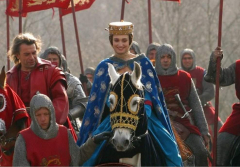 Daughter of Philip IV of France and the mother Of Edward III Of England.
Her husband Edward II was homosexual and so she formed a liaison with Roger Mortimer, formed an army and successfully invaded England, deposed her husband and murdered him. Incredibly this was not her most outrageous activity!
Daughter of Philip IV of France and the mother Of Edward III Of England.
Daughter of Philip IV of France and the mother Of Edward III Of England.
Her husband Edward II was homosexual and so she formed a liaison with Roger Mortimer, formed an army and successfully invaded England, deposed her husband and murdered him. Incredibly this was not her most outrageous activity!
Daughter of Philip IV of France and the mother Of Edward III Of England.Her husband Edward II was homosexual and so she formed a liaison with Roger Mortimer, formed an army and successfully invaded England, deposed her husband and murdered him. Incredibly this was not her most outrageous activity!
 Philip IV of France had three sons, Louis who was married to Margaret of Burgundy, Charles, who was married Blanche of Burgundy and Philip
who married Blanche's sister Jeanne.
All three ladies were involved in a court of love held in the Nestle Tower and were betrayed by none other than their sister in law Isabelle, who may or may not have been involved herself.
Philip IV of France had three sons, Louis who was married to Margaret of Burgundy, Charles, who was married Blanche of Burgundy and Philip
who married Blanche's sister Jeanne.
All three ladies were involved in a court of love held in the Nestle Tower and were betrayed by none other than their sister in law Isabelle, who may or may not have been involved herself.
Philip IV of France had three sons, Louis who was married to Margaret of Burgundy, Charles, who was married Blanche of Burgundy and Philip
who married Blanche’s sister Jeanne.
All three ladies were involved in a court of love held in the Nestle Tower and were betrayed by none other than their sister in law Isabelle, who may or may not have been involved herself.
 All three of the accused were incarcerated which totally disrupted the French plans for succession. The net result of this was that her son edward became heir to the french throne
All three of the accused were incarcerated which totally disrupted the French plans for succession. The net result of this was that her son edward became heir to the french throne
All three of the accused were incarcerated which totally disrupted the French plans for succession. The net result of this was that her son edward became heir to the french throne
All three of the accused were incarcerated which totally disrupted the French plans for succession. The net result of this was that her son edward became heir to the french throne
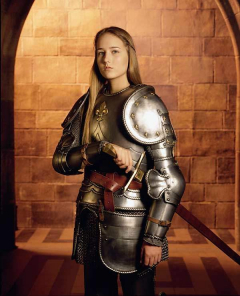 At the age of seventeen Joan became commander of the French army at a time when they had capitulated and the French crown had been offered to Henry IV of England. Her origins are rarely disputed, she was a farm girl who heard voices and she was divinely inspired
Joan turned the tide of the war but was then betrayed and burnt at the stake as a heretic.
What is not often mentioned is that the reversal came about because of Joan's innovative battle tactics, which were still being used three hundred years later.
It was Joan who introduced elevated firearms and cannons from experimental toys to formidable weaponry. Some of the essential development work was done to her instructions.
At the age of seventeen Joan became commander of the French army at a time when they had capitulated and the French crown had been offered to Henry IV of England. Her origins are rarely disputed, she was a farm girl who heard voices and she was divinely inspired
At the age of seventeen Joan became commander of the French army at a time when they had capitulated and the French crown had been offered to Henry IV of England. Her origins are rarely disputed, she was a farm girl who heard voices and she was divinely inspired
Joan turned the tide of the war but was then betrayed and burnt at the stake as a heretic.
What is not often mentioned is that the reversal came about because of Joan's innovative battle tactics, which were still being used three hundred years later.
It was Joan who introduced elevated firearms and cannons from experimental toys to formidable weaponry. Some of the essential development work was done to her instructions.
At the age of seventeen Joan became commander of the French army at a time when they had capitulated and the French crown had been offered to Henry IV of England. Her origins are rarely disputed, she was a farm girl who heard voices and she was divinely inspiredJoan turned the tide of the war but was then betrayed and burnt at the stake as a heretic.
What is not often mentioned is that the reversal came about because of Joan’s innovative battle tactics, which were still being used three hundred years later.
It was Joan who introduced elevated firearms and cannons from experimental toys to formidable weaponry. Some of the essential development work was done to her instructions.
